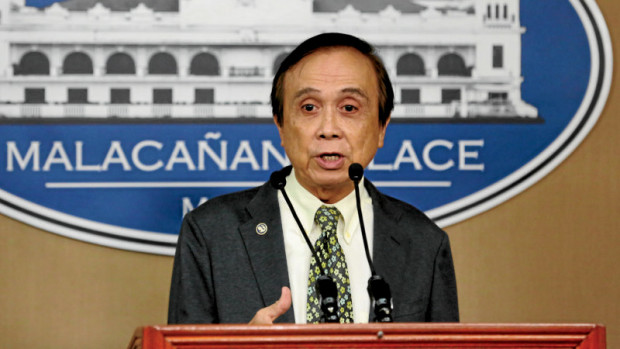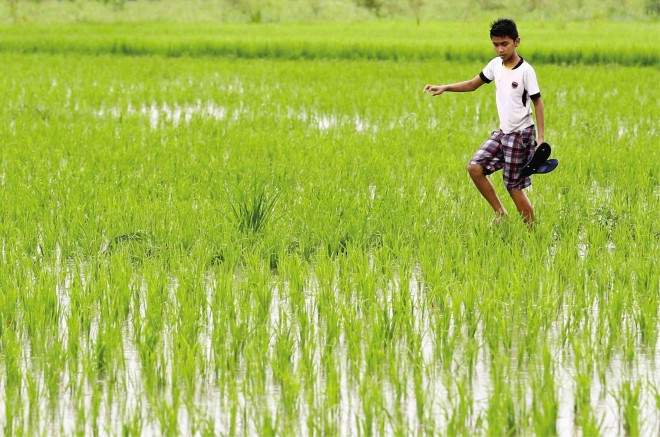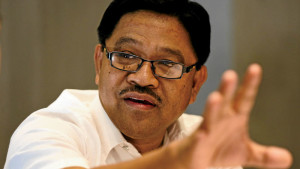Ban on land conversion not to be signed soon by Duterte – NEDA
MANILA — The country’s chief economist said the draft executive order aimed at a two-year farm land conversion ban would “unlikely” be signed by President Duterte anytime soon.
“It’s still being studied carefully by the Office of the President,” Socioeconomic Planning Secretary Ernesto M. Pernia told reporters last week.
But for Pernia, who heads state planning agency National Economic and Development Authority, economic managers have “strong counterarguments” to the Department of Agrarian Reform’s proposal.
“We feel we have stronger economic arguments,” Pernia said.
Last year, economic managers and the umbrella agency for housing development have called on the DAR to instead pursue the enactment of a national land use law as well as strictly implement existing land use regulations instead of imposing a two-year ban on farm land conversion.
In opposing the draft executive order (EO) aimed at putting in place amoratorium on the conversion of agricultural land into non-agricultural uses, five government agencies said such proposal “can have adverse impacts on agriculture sector revitalization, meeting the housing backlog, accelerating infrastructure development, and other economic activities which are currently on expansionary mode.”
The three-page joint position paper submitted by NEDA to the Office of the President last Oct. 3 was signed by Pernia, Finance Secretary Carlos G. Dominguez III, Budget Secretary Benjamin E. Diokno, Trade Secretary Ramon M. Lopez, and Vice President Ma. Leonor G. Robredo, who then chaired the Housing and Urban Development Coordinating Council (HUDCC).
“While we are one with DAR in finding ways to address the country’s food security concern, food security has to be met through some other means,” Pernia said in October.
Pernia noted that “when the applications for conversion to agro-industrial use are denied, land requirements of agriculture-based processing and manufacturing activities may not be met.”
Also, “other sectors can be similarly affected, such as the expanding services sector which will need large commercial spaces,” the NEDA chief pointed out. According to the position paper signed by some Cabinet officials, more than 27.5 percent of manufacturers as well as 29.5 percent of agricultural, fishery and forestry firms have “significant” plans to expand their businesses, based on the Bangko Sentral ng Pilipinas’ Business Expectations Survey.

NEDA Director Ernesto Pernia in a press briefing held in Malacañang Palace.
INQUIRER FILE PHOTO/JOAN BONDOC
“Paradoxically, agriculture sector revitalization may suffer under this policy, which purports to protect that sector in the first place. When the applications for conversion to agro-industrial use are denied, the land requirements of agriculture-based processing and manufacturing activities may not be met,” the position paper read.
The five agencies instead called for the expansion of agriculture-based processing as well as manufacturing not only for the domestic market but also for export to make food affordable, increase farmers’ incomes, and also generate more export revenues.
The impact on housing development could not also be ignored, with the housing backlog expected to exceed 5.5 million units this year, Pernia
added.
“The ban on land use conversion will introduce further delays in reducing the backlog. In addition to this, the ban will also impede the development of resettlement and evacuation areas, especially in disaster-stricken areas, as these sites are mostly within agricultural zones,” the position paper said.
“Simply put, this will result in delayed improvement in the living conditions of millions of Filipinos with the increase in cost of land for housing due to the unnecessary locking up of land resources. In short, the ban will be anti-poor,” it added.
Government data showed that at end-2015, the total area approved for land use conversion was just 151,795.37 hectares or only 1.2 percent of the country’s total agricultural land resource.
For both public and private infrastructure projects, the acquisition of right-of-way would likely be delayed in areas where there is a need to first apply for land use conversion if the EO pushes through, according to Pernia.
“Meeting the target public infrastructure spending of 5-7 percent of GDP [gross domestic product] during the current administration rests crucially on timely right-of-way acquisition,” the five agencies said.
As a whole, despite the country currently being in a “rapid” growth trajectory, the implementation of a land use conversion moratorium “can be antithetical to economic growth, job generation and poverty reduction,” the officials said.
The position paper nonetheless “supports the DAR proposal to create a task force that will assess the status of land use conversion in the country and seek the necessary support of other implementing agencies.”
“In the immediate term, government should strictly implement existing laws regulating land use conversion, which already cover non-conversion of prime agricultural lands, lands subject to land reform, irrigated lands, irrigable lands, protected areas and other areas non-negotiable for conversion, and quickly clarify and decide the parameters for land use conversion,” the position paper said.
Moving forward, “the legislature should enact a national land use code covering not only land use conversion regulation but also effective land administration, such as timely titling of lands and taxing idle lands sufficiently so that owners will put them to appropriate uses,” according to the position paper.
A national land use code is also expected to “help reduce congestion in Metro Manila and other emerging metropolitan cities, such as Cebu and Cagayan de Oro,” it further read. SFM/rga
















